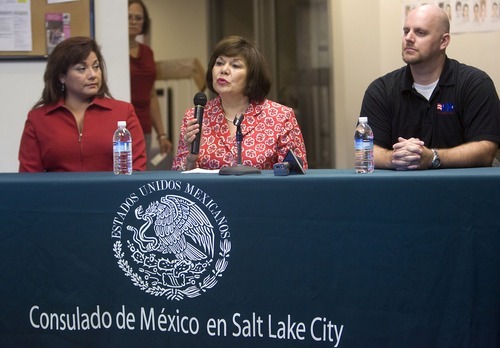This is an archived article that was published on sltrib.com in 2012, and information in the article may be outdated. It is provided only for personal research purposes and may not be reprinted.
Workers, both legal and illegal, remain at risk for being exploited by employers not paying overtime or not accessing worker compensation for injuries suffered on the job, labor officials said Monday during a kick-off ceremony of Labor Rights Week at the Mexican Consulate in Salt Lake City.
The warning came as a part of the national Labor Rights Week movement, which featured a video message by U.S. Department of Labor Secretary Hilda Solis and a series of local presentations in 11 cities around the country.
Socorro Rovirosa, the Mexican consul in Salt Lake City, told a crowd of about 30 sitting in the consulate that it is important to report violations of labor laws — including unpaid wages for work completed or unsafe working conditions, which could lead to injuries or death.
"An informed community is a safe community," Rovirosa said.
Solis said hourly workers are entitled to overtime pay beyond 40 hours a week and that nobody can be paid less than $7.25 an hour.
"If you're working in this country, you're guaranteed these rights," Solis said. "You're an important part of our labor force."
Joseph Doolin, assistant district director of the Labor, Wage and Hour Division of the Labor Department, said illegal immigrants are often most at risk because they are fearful to come forward and lodge complaints with his department.
Doolin said at the event Monday he wanted to emphasize that no information provided by workers would be shared with U.S. Immigration and Customs Enforcement officials.
"There is a lot of fear in the community — mostly fear that they'll be deported if they complain," Doolin said. "But we know there is a lot of wage theft going on, and we just want to help people get paid for the work that they are doing."
Elena Bensor, spokeswoman for the Utah Labor Commission, said wage theft and medical costs from on-the-job injuries are the top areas of concern.
According to Bensor, the Utah Labor Commission showed 1,086 wage claims were filed and, of those, 359 were successfully resolved and a total of $454,331 was collected and paid out to workers.
She said for illegal immigrants, job injuries remain a statewide problem, and a usual scenario is when an employer tells a worker that they'll cover the medical bills instead of letting the employee file a worker's compensation claim.
"Then the employer sees the cost of the medical bills, and suddenly they won't help," Bensor said. "If you're injured on the job, you are entitled to rights."
Bensor said the commission, which has an informal agreement with the U.S. Department of Labor to refer cases, is aggressively taking on job-safety issues this year and even produced a new DVD and video in Spanish to explain worker safety in agricultural operations.
The video, titled "Nuestra Esperanza" ["Our Hope"] is a 37-minute video that outlines subjects from safety procedures on tractors, among livestock and working with pesticides and chemicals.
It was produced by the commission and Bensor said several states — including California — have sought to use it for educational purposes as well.
Twitter: @davemontero —
Labor Rights Week Aug. 27-31
To file complaint • 60 E. South Temple, Suite 575, Salt Lake City, or call: 801-524-5706 or 1-866-487-9243





